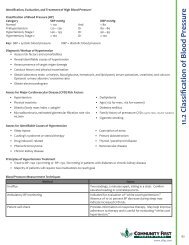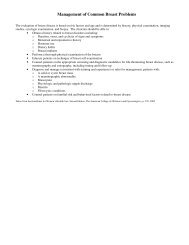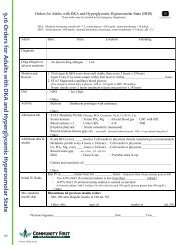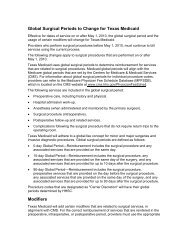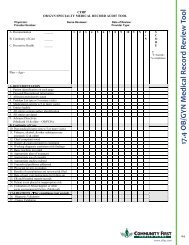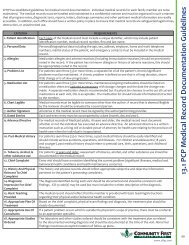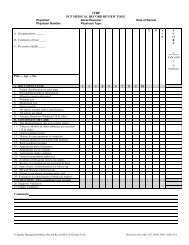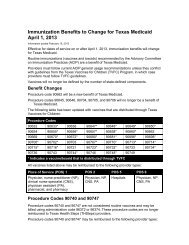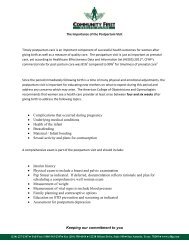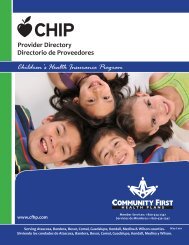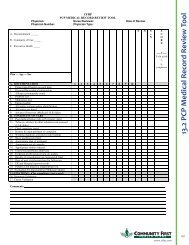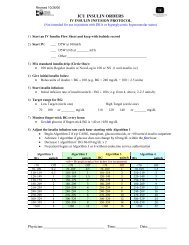Full Clinical Guidelines - Community First Health Plans.
Full Clinical Guidelines - Community First Health Plans.
Full Clinical Guidelines - Community First Health Plans.
You also want an ePaper? Increase the reach of your titles
YUMPU automatically turns print PDFs into web optimized ePapers that Google loves.
PREVENTION RECOMMENDATIONS<br />
1. The Expert Committee recommends that physicians and allied healthcare providers counsel the following:<br />
a.<br />
For children aged 2-18 years whose BMI is at or above the 5th percentile and no greater than the 84th percentile:<br />
i. Dietary Intake:<br />
1. Limiting consumption of sugar-sweetened beverages and encouraging consumption of diets with recommended<br />
quantities of fruits and vegetables.<br />
ii. Physical Activity:<br />
1. Limiting television and other screen time to 1 or 2 hours per day in children starting as young as age 5 years, as<br />
advised by the American Academy of Pediatrics and removing television and computer screens from children’s<br />
primary sleeping area.<br />
iii. Eating Behaviors:<br />
1. Eating breakfast daily.<br />
2. Limiting eating out at restaurants, particularly fast food restaurants.<br />
3. Encouraging family meals in which parents and children eat together.<br />
4. Limiting portion size.<br />
2. The Expert Committee recommends that physicians, allied healthcare professionals, and professional organizations<br />
advocate for:<br />
a. The federal government to increase physical activity at school through intervention programs as early as grade<br />
1 through the end of high school and college, and through creating school environments that support physical<br />
activity in general.<br />
b. Supporting efforts to preserve and enhance parks as areas for physical activity, informing local development<br />
initiatives regarding the inclusion of walking and bicycle paths, and promoting families’ use of local physical activity<br />
options by making information and suggestions about physical activity alternatives available in doctors’ offices.<br />
3. The Expert Committee recommends using the following techniques to aid physicians and allied healthcare providers who<br />
may wish to support obesity prevention in clinical, school, and community settings:<br />
a. Actively engaging families with parental obesity or maternal diabetes, because these children are at increased risk<br />
for developing obesity even if they currently have normal BMI.<br />
b. Encouraging an authoritative * parenting style in support of increased physical activity and reduced sedentary<br />
behaviour, providing tangible and motivational support for children.<br />
c. Discouraging a restrictive † parenting style regarding child eating.<br />
d. Encouraging parents to model healthy diets and portion sizes, physical activity, and limited television time<br />
e. Promoting physical activity at school and in child care settings (including after school programs), by asking children<br />
and parents about activity in these settings during routine office visits.<br />
4. The Expert Committee suggests that children of healthy weight participate in 60 minutes of moderate to vigorous physical<br />
activity daily.<br />
i. The 60 minutes can be accumulated throughout the day, as opposed to only single or long bouts.<br />
ii. Ideally, such activity should be enjoyable to the child<br />
iii. Whereas some health and psychological benefits may be attained by achieving the 60 minute goal, greater duration<br />
should yield increased benefit<br />
5. The Expert Committee also suggests counselling patients and families to perform these behaviors:<br />
i. Dietary Intake:<br />
1. Eating a diet rich in calcium<br />
2. Eating a diet high in fiber<br />
3. Eating a diet with balanced macronutrients (calories from fat, carbohydrate, and protein in proportions for age<br />
recommended by Dietary Reference Intakes)<br />
4. Encouragement, support, and maintenance of breastfeeding<br />
ii. Eating Behaviors:<br />
1. Limiting consumption of energy-dense foods.<br />
* Authoritative parents are both demanding and responsive. “They monitor and impart clear standards for their children’s conduct. They are assertive, but not<br />
intrusive and restrictive. Their disciplinary methods are supportive, rather than punitive. They want their children to be assertive as well as socially responsible,<br />
and self-regulated as well as cooperative” (Baumrind, 1991, p. 62).<br />
† Restrictive parenting (heavy monitoring and controlling of a child’s behavior)<br />
H EALTH PLANS<br />
www.cfhp.com<br />
157



